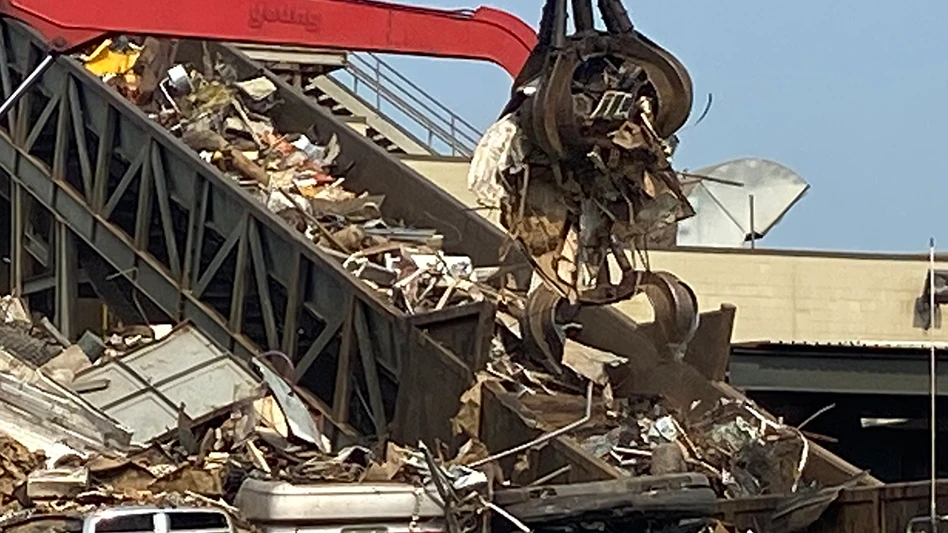
Recycling Today archives
A Los Angeles Superior Court judge has ruled in favor of Lancaster, California-based Pacific Auto Recycling Center (PARC) in a legal battle the auto recycler and shredder is engaged in with the California Department of Toxic Substance Control (DTSC).
According to a news release issued by Chicago-based law firm Sidley Austin LLP, the regional judge granted a petition for a writ of mandate in mid-June against the DTSC on behalf of PARC.
Sidley says that for 30 years, the metal shredding industry has operated under a DTSC policy document “effectively stating that the residue waste generated at the end of the scrap metal recycling process was potentially subject to hazardous waste controls, but the mid-stream processing of scrap metal was not.”
The law firm notes that two years ago, in a policy action it rescinded after opposition expressed by the recycling industry (including the Institute of Scrap Recycling Industries), DTSC tried to declare an emergency clampdown on shredding activity.
RELATED: A state of scrutiny
Although a court issued an injunction against the emergency rule, in response to ISRI and others, “DTSC did not reinstate the rescinded policy, [but] instead has proceeded with enforcement activity that is contrary to the longstanding policy and premised on the same regulatory change of the enjoined emergency rule," the law firm says.
In granting the petition in mid-June, the Superior Court found that based on “the industry’s more than 30-year reliance on [DTSC Official Policy/Procedure (OPP) #88-6], allowing the rescission of OPP #88-6 to remain in effect would increase the costs of scrap metal recycling, thereby causing significant disruption to an issue of critical environmental importance to California.”
The court concluded the DTSC carrying out an enjoined policy “violated the California Administrative Procedure Act, and was arbitrary and capricious for failure to consider the industry’s reliance interests.” Accordingly, adds the law firm, the judge granted the petition to require DTSC to reinstate the pre-Emergency Rule policy.
“The ruling is a significant victory for PARC and the industry in general, which has been litigating these issues for several years across different proceedings,” Ridley says, The firm credits Maureen Gorsen of the Sidley office in Century City, California, for work on the case, as well as a “multidisciplinary litigation team” comprised of people from Sidley’s Environmental, Regulatory Litigation and Commercial Litigation and Disputes practice groups.
An exclusive Recycling Today interview with Gosen indicates that while the victory is helpful to PARC, shredding plant operators in California may well continue to fend off scrutiny from the DTSC.
Recycling Today (RT): How was PARC harmed by the DTSC policy (or enforced non-policy, it seems), and why did it seek your help?
Maureen Gosen (MG): Scrap metal recycling has been recognized by the United States Environmental Protection Agency (EPA) and all 50 states as a valuable resource recovery and conservation activity. Similarly, federal law and the laws of all states recognize scrap metal as a valuable product that is both bought and sold. DTSC sought to change this longstanding understanding without use of a democratic, legislative or regulatory process. In doing so, DTSC applied the rules that govern wastes headed to landfills to regulate scrap metal as a “waste” – not a product – and regulate scrap metal recycling as a “hazardous waste treatment.” This imposed very expensive and burdensome requirements not intended for the lawful processes used to turn scrap metal into useful products or the resulting valuable commodities themselves. What DTSC has been trying to do is wrong on so many levels – environmental, economic and legal. PARC had no choice but to seek help from the courts to stop DTSC’s actions.
RT: Who did Sidley Austin turn to seek allies or friendly expert opinions to help establish that DTSC was acting beyond its purview?
MG: Unfortunately, PARC had to take on this fight solo – a brave and expensive act, but one necessary to PARC’s very survival. PARC reached out to its elected representatives and filed a petition to U.S. EPA to seek its help in stopping DTSC from upending the goals and purposes of the Resource Recovery and Conservation Act (RCRA) in California, but alas had to seek redress by itself in the judicial branch.
RT: To what extent does PARC (and the scrap industry in California) retain concerns that DTSC, or at least some staff members, will continue to find ways to disrupt operations for metals recyclers?
MG: An extremely high level of concern. Since 2012, DTSC has been on a quest to regulate this valuable economic activity as a “waste treatment” activity. Its desire to regulate scrap metal recycling, which bears no resemblance to waste treatment, is not grounded in the law. The scrap metal materials bought by PARC are valuable economic commodities. The scrap metal [products] sold by PARC are also valuable economic commodities. Stated differently, neither the material inputs nor material outputs at PARC are “waste” – they are products. Unfortunately, there appears to be no end to DTSC’s attempts to regulate this valuable product processing activity as a “hazardous waste treatment” even though none of these products are disposed of or end up in any landfill, but are sold as products.
.
Latest from Recycling Today
- BMW Group, Encory launch 'direct recycling’ of batteries
- Loom Carbon, RTI International partner to scale textile recycling technology
- Goodwill Industries of West Michigan, American Glass Mosaics partner to divert glass from landfill
- CARI forms federal advocacy partnership
- Monthly packaging papers shipments down in November
- STEEL Act aims to enhance trade enforcement to prevent dumping of steel in the US
- San Francisco schools introduce compostable lunch trays
- Aduro graduates from Shell GameChanger program





